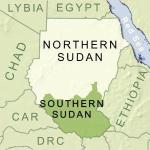08 January 2010

in South Sudan Raid
At least 139 people are dead from a tribal raid in southern Sudan. Aid officials and analysts have warned that the escalating violence in the South - which left over 2,500 dead last year - threatens the regional peace as a Southern secession vote nears.
A group of Nuer tribesmen in South Sudan's Warrap state reportedly slaughtered 139 Dinka and stole thousands of heads of cattle. An unknown number of Nuer raiders were also killed in the attack.
The deadly attack took place earlier this week, but reports of the deaths took a few days to make its way out of the remote village. A U.N. military team sent to the area was expected to take a couple days to arrive. South Sudan only has about 50 kilometers of paved roads.
Cattle are the cultural currency for many of the region's tribes, necessary not just as food but for dowry payments and social status. Cattle rustling is traditionally common among the southern communities, but the past year brought levels of violence not normally seen.
David Gressly is the top U.N. official in the South. In a recent interview in the capital Juba, he told VOA that the bloodshed can mostly be attributed to local disputes.
"What's key here is that the grievances that these communities have - these are very much broken down on tribal or clan lines - these grievances need to be addressed and resolved," Gressly said. "And they relate to access to water, access to pasturelands. Traditionally, there are negotiations which take place; these systems have broken down in a few places."
Senior Southern officials routinely accuse the Khartoum regime of deliberately fueling the inter-tribal strife in their territory through the support of local militias, a main tactic of the North during the long civil war. The ruling northern NCP party flatly denies such charges, and critics of the former Southern rebels say that their governing party has failed to provide the necessary security and leadership to stem the instability.
An investigative report two weeks ago from the think-tank International Crisis Group concluded that the truth likely falls "somewhere in between." The group was investigating the same type of violence in the South's Jonglei state, where the worse of the clashes have been seen.
Although he says the possibility of manipulation from outside forces is there, Gressly said that no hard evidence has been presented yet to back up those claims.
"So far we've not seen or been presented anything that allows us to give any kind of definitive statement on that," he said. "We have to be guided by the two parties in terms of where they see these allegations so that they can be properly investigated. We do that jointly, and we've done that many many times. But there has been nothing credible put on the table for us to work with."
The Dinka and the Nuer are the two biggest tribes in the South, the Dinka constituting about 40 percent of its population and the Nuer around 20 percent.
In 1991, following a split in the southern rebel SPLA leadership, Nuer militias killed some 80,000 civilians - mostly Dinka - around the city of Bor in what became known as the "Bor Massacre."
On Thursday, a group of ten prominent aid groups warned that the situation in south Sudan was sliding back to renewed conflict and called for international intervention. This weekend a new coalition campaign calling itself "Sudan365" is organizing peace rallies in 15 cities around the world to urge more international attention be given to bolstering the tenuous peace agreement in Sudan.